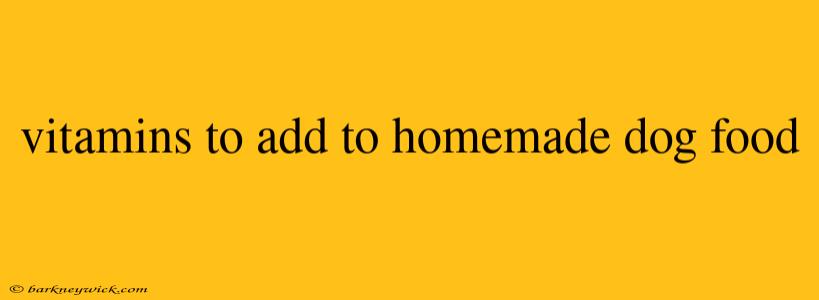Boosting Your Dog's Health: Vitamins for Homemade Dog Food
Have you ever considered making your dog's food at home? I know I have! I love knowing exactly what goes into my furry friend's meals, and it feels great to give him the freshest, most nutritious ingredients. But even with the best intentions, homemade dog food can sometimes fall short on essential vitamins. That's why I've been researching the best vitamins to add to my dog's homemade diet, and I'm ready to share my findings with you.
Why Vitamins Are Crucial
Think of vitamins as the superheroes of your dog's health. They play a vital role in everything from energy production and immune function to maintaining strong bones and a shiny coat. While a balanced homemade diet can provide many essential nutrients, some vitamins are difficult to get consistently through whole foods alone.
Key Vitamins for Your Dog
Here are some of the most important vitamins to consider adding to your dog's homemade food:
1. Vitamin A (Retinol): Essential for healthy vision, skin, and a strong immune system. Good sources include: * Fish oil (Salmon, cod liver oil) * Sweet potatoes * Carrots * Beef liver
2. Vitamin D (Cholecalciferol): Promotes bone health and calcium absorption.
* Sunlight exposure (but not too much!)
* Fatty fish (Salmon, mackerel)
* Eggs
3. Vitamin E (Alpha-tocopherol): An antioxidant that protects cells from damage.
* Wheat germ oil
* Almonds
* Spinach
* Sunflower oil
4. Vitamin K (Phylloquinone): Vital for blood clotting and bone health.
* Kale
* Spinach
* Broccoli
* Cabbage
5. Vitamin B Complex: This group of vitamins plays a vital role in energy production, brain function, and red blood cell production. * Meat sources (beef, chicken, fish) * Eggs * Dairy products * Whole grains
6. Biotin (Vitamin B7): Essential for healthy skin, coat, and nails. * Liver * Egg yolks * Salmon * Yogurt
Adding Vitamins to Homemade Dog Food
1. Consulting a Veterinarian: Before adding any supplements, always consult your vet! They can determine the appropriate dosage based on your dog's size, breed, and individual needs.
2. Choosing High-Quality Supplements: Opt for high-quality, veterinarian-approved supplements. Look for brands that are specifically formulated for dogs.
3. Mixing into Food: Carefully follow the dosage instructions on the supplement label and mix them into your dog's food.
4. Monitoring for Any Side Effects: It's important to monitor your dog for any side effects after starting a new supplement. If you notice anything unusual, consult your veterinarian.
Example: My Dog's Vitamin Routine
My dog, Max, loves homemade food! I incorporate things like beef, sweet potatoes, and carrots into his meals. To supplement his diet, I give him a multivitamin specifically formulated for dogs, which includes vitamins A, D, E, K, and B Complex.
It's important to note: Just because you can't see them doesn't mean vitamins aren't important! If you're considering switching to homemade dog food, remember that adding the right vitamins is key to ensuring your furry friend gets all the nutrients they need.
Final Thoughts
Making your dog's food at home can be incredibly rewarding, but it's essential to ensure they are receiving the right nutrients. By understanding the importance of vitamins and adding them to your dog's homemade diet, you can help them live a longer, healthier life. Always consult your veterinarian for personalized advice on choosing the best supplements and dosage for your canine companion.
